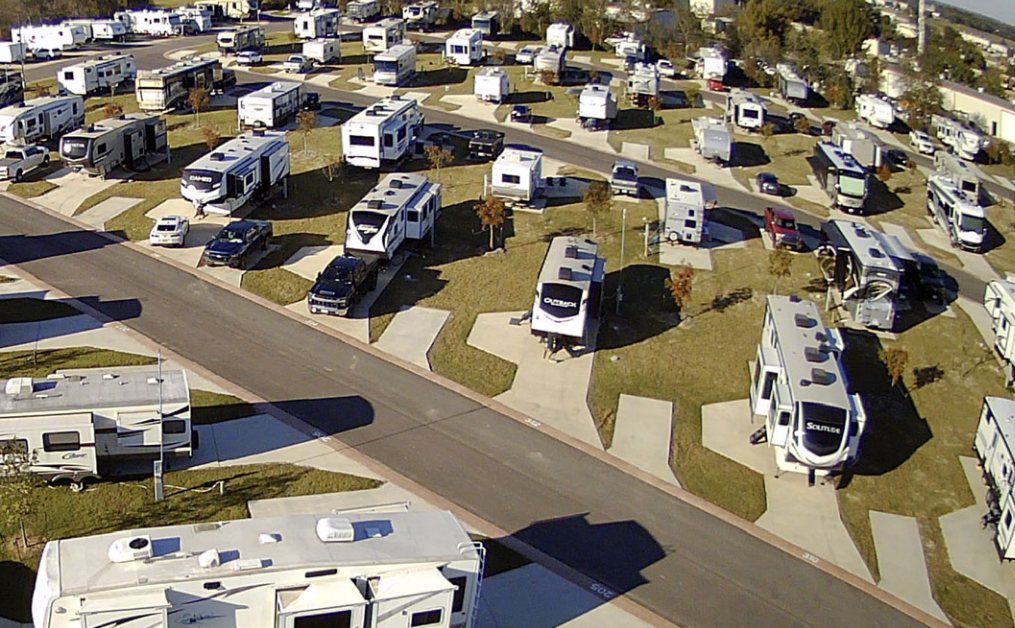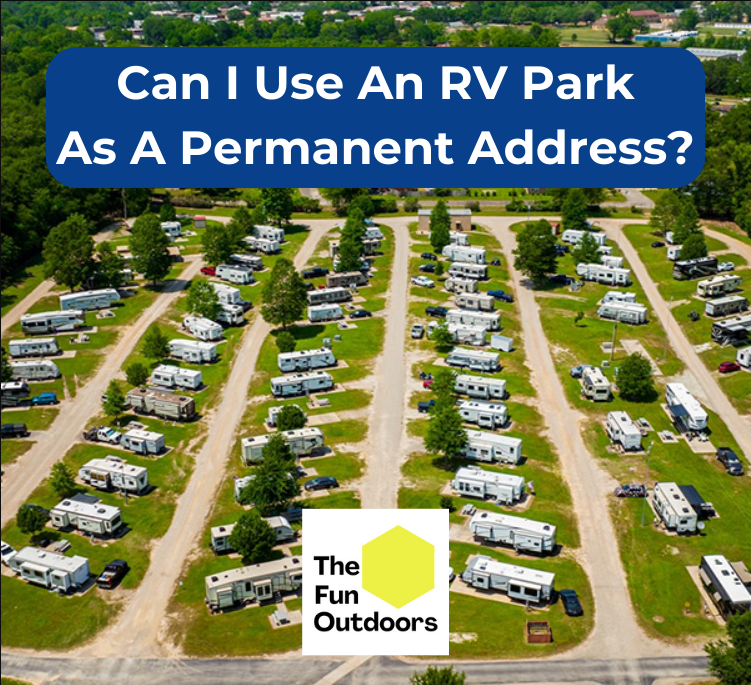If you’re considering RV life, it’s important to understand the challenges of establishing a permanent address. While you may spend a lot of time on the road, many states and regions require you to have a physical address. So can you use an RV park as a permanent address?
RV parks are not designed to be full-time residences, so you cannot use an RV park as a permanent address.
So, what are your options? In this article, we’ll explore how to establish a state of residency, how to get a physical address, and six easy ways of how to receive mail and packages if you live in an RV.
Key Takeaways
- RV parks can’t be used as permanent addresses.
- You must establish a state of residency.
- You can get a physical address and receive mail and packages while on the road.
Can I Use An RV Park As A Permanent Address?

No, you cannot use an RV park as a permanent address. Even if you stay there for a year, RV parks are not designed to be full-time residences and cannot legally be accepted as permanent addresses.
However, you can establish a state residency by acquiring a physical address through services which offer mail-forwarding services to connect you with a particular state. We’ll cover these options in detail later in this guide.
It’s important to establish your domicile state to register your vehicle, vote, and receive legal documents so you can then get a physical address. Your domicile state is also called your state of residency.
You Must Have a State of Residency
As a full-time RVer, it’s important to establish a state of residency. This is because legally, every US citizen needs to have a permanent address linked to their name. Without a state of residency, you won’t be able to do things like get a driver’s license, open a bank account, register your vehicle, get a passport, purchase any insurance, or file your taxes. These are just a few examples of the many things that require a permanent address.
As an RVer, you do have the flexibility to choose a state of residency that works best for your lifestyle. Some of the most favorable states for RVers and boondockers include Texas, South Dakota, and Florida. However, it’s important to research the laws and regulations of each state before choosing your permanent address.
When choosing a state of residency, consider factors such as tax benefits, vehicle registration and inspection laws, homeschooling regulations, chances of getting jury duty, local insurance rates, and minimum stay regulations.
Keep in mind that even though you may not spend much time in your state of residency, you may still be questioned by authorities about why you’re so far away from home. Having a practical response ready can help alleviate any suspicions.
In addition to establishing a state of residency, it’s also important to consider RV insurance. Full-timer RV insurance is a set of optional coverages that provides protection for those who use their RV as their permanent residence.
This type of insurance is typically defined as residing in a motorhome or travel trailer for more than six months out of the year.
See Related: How Much Is Camper Insurance?
How Do I Get a Physical Address If I Live In An RV?

If you’ve chosen a state to establish residency in, the next step is to get a physical address. Here are six ways to do it:
Use a Friend or Family Member’s Address
If you have a friend or family member in your chosen state who is willing to let you use their address, this is the easiest and most cost-effective option.
You can use their address for your driver’s license, vehicle registration, mailing address, and voter’s registration.
Make sure that the person is trustworthy and reliable enough to forward your mail promptly. You don’t want to miss any important communications that come through the mail.
Get A P.O. Box
A PO box is relatively easy and affordable, but may not work with all types of mail or packages, so consider your specific needs first before getting one.
Use A Mail Forwarding Service
Mail forwarding services provide a fixed address for you to receive your mail at, then they send your mail to your current location.
This is an excellent option for RVers who are constantly traveling as you only need to update your forwarding service with your current location, rather than every company or person who may be sending you mail or packages.
Get A Virtual Mailbox
A virtual mailbox is a newer solution that allows you to view your mail online rather than have it forwarded to you.
This is an affordable and convenient solution, but you’ll still need a physical address for things like driver’s licenses and voter registration.
Use a Residency Service
If you don’t have any friends or family members in your chosen state or don’t want to bother them, you can use a residency service.
These services provide full-time RVers with a legal permanent address they can use for their dealings with the government and other institutions. They also offer mail forwarding services, so you can always stay on top of your mail.
Using a residency service can be more expensive than using a friend or family member’s address, but it can be worth it if you don’t have any other options or want the added benefits of mail forwarding and a legal address.
Make sure to research different residency services and choose one that suits your needs and budget.
Register Your RV As A Domicile
If you go through the process of registering your RV as a domicile, you can then use your RV’s actual address for things like voter’s registration, vehicle registration, and more, simplifying a lot of the headaches of getting mail in an RV.
This can come with different complexities based on the state you’re registering your RV as a domicile in, and can include inspections or extra hoops to jump through.
Registering your RV as a domicile is not a good solution if you plan on traveling in your RV.
How to Get Your Mail While RVing
If you’re not at the physical address where your mail is, you have a few options. The first two are best reserved for friends or family members you trust.
You can call and have someone open the letters and read them to you, or have them scan and email the mail content. Another option is to set up mail forwarding so that full letters and even packages are sent to a new address.
You can use USPS, get a mailbox at a local UPS store, or use a professional RV mail forwarding service like Escapees RV Club’s Mail Service. Some RV parks also accept packages for guests.
How to Get Packages While RVing

When it comes to receiving packages while RVing, there are several options available to you. Most online shopping platforms allow for delivery to varied addresses as long as you provide a clear location.
You can have your package delivered to your RV park or campground, provided it is within the delivery service’s coverage.
Alternatively, you can have your package delivered to your workplace or a friend’s workplace.
If you prefer, you can also ship your package to a post office or a UPS store. However, keep in mind that shipping straight to your RV park or campground may be easier and have less bureaucracy and sorting than at the post office or UPS store.
Some campgrounds may be able to accept packages for you if you make the right arrangements with management.
How to Receive Payments or Checks on the Road
If you’re a digital nomad or a full-time RVer, you’ll need to figure out how to receive payments and checks while on the road. Here are some tips to help you out:
- Encourage clients to use wire transfer, PayPal, Cashapp, Venmo, or any other direct bank transfer service for payments.
- If a client insists on sending a check, have it sent to a trustworthy address. Consider using a family member or close business associate who you trust to receive and deposit the check into your account.
- Avoid using residency services to receive checks as they may not be trustworthy.
By following these tips, you can ensure that you receive payments and checks safely and securely while on the road.

